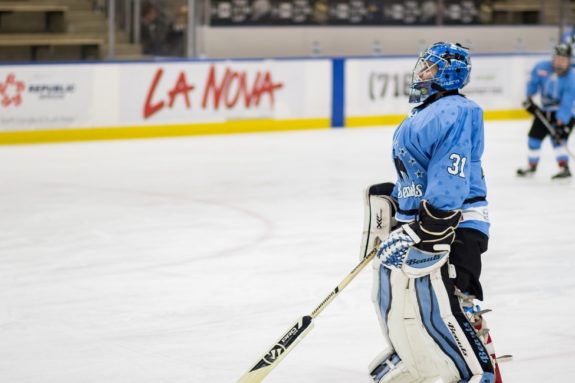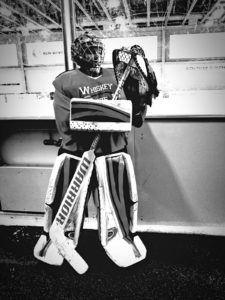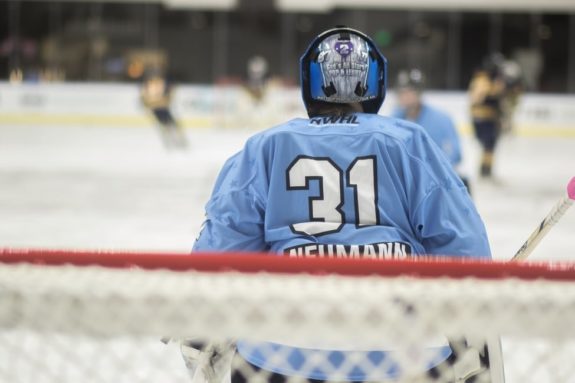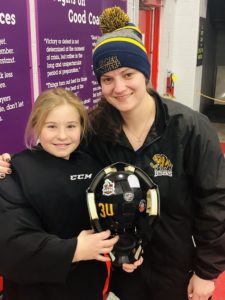From a young age we are often taught “never let ’em see you cry.” It does not stop there. Additional phrases — while certainly intended to be positive — are tossed around too loosely and end up masking what lies underneath. Athletes especially have heard the adages “keep cool under pressure”, “don’t let them see you sweat”, “he/she was harder on himself/herself than what the coach was”, and so on and so forth.
While words such as these are spoken usually with the best of intentions, we can only hear the same slogans so many times. How often can you put a bandage on the same wound again and again? How often can you set your face like flint? Pain is real and emotions are real, and they can only be pushed to the wayside so many times.

Hockey goalies may have the most protective equipment on their bodies, but they are arguably the least guarded and the least protected in their own hearts and minds. A goalie is the last line of defense on a team, and more often than not bears the brunt of a missed play or misread maneuver — whether it is their fault or not.
Recent news such as goaltender Ben Meisner’s “I’m Not Connor McDavid” piece for the Player’s Tribune and New York Islanders netminder Robin Lehner opening up about bipolar disorder, ADHD and PTSD have brought mental health awareness to light in a big way for the hockey community. These are necessary steps in ending the stigma that surrounds such issues. If professional hockey players can talk about it openly and be okay with doing so, can others follow suit?
Former Buffalo Beauts goaltender Kelsey Neumann is endeavoring to do the same for female hockey goalies and throughout the women’s game at all levels.
Becoming Involved With “Lift the Mask”

Neumann was a Buffalo Beauts goaltender for two seasons. Her rookie season was as a member of the 2016-17 NWHL Isobel Cup-winning squad. She would return for a second season for Buffalo in 2017-18, and brought veteran leadership and character to a Beauts team that made a third straight trip to the Isobel Cup Final.
In Sept. 2018 Neumann officially became an ambassador for The Goalie Guild’s “Lift the Mask” initiative. The goal of “Lift the Mask” is to provide goalies of all ages with a platform for getting the mental illness support that they need. This is done so by providing fellow goalies with someone to talk to, assistance with garnering professional help, and an opportunity to share one’s story.
“For me,” Neumann shared, “I have gotten to know Justin Goldman, the guy behind The Goalie Guild the last few years. I read both of his books – Embracing the Grind and The Power Within. I really started to realize that a lot of things that I’ve struggled with, other goalies are struggling with. So that was a nice connection. Then when he made a comment about “Lift the Mask” and wanting to start something like that, I right away knew that I wanted to be a part of it. I just reached out to him on Instagram, and was like ‘Hey, this is something I’d really like to be a part of – how can I help? What can I do? What does it entail?’, and have just been doing it since.”
It is often the ones who are the most kindhearted outwardly that may be having the hardest struggles on the inside. Neumann was the Beauts’ recipient of the 2017 NWHL Foundation Award. The award is given annually to the player most actively applying the core values of hockey to her community as well as growing and improving hockey culture. Despite what she has done for others, Neumann has had to face her own struggles with ADHD and depression, in addition to having dyslexia. The entire guise of “Lift the Mask” is something that has hit very close to home for her.
“Right now ‘Lift the Mask’ is strictly for goalies because we are a different breed, I guess you could say,” Neumann went on to explain. “I think that it’s important to know that they (‘Lift the Mask’) are offering up to $100 for mental health services. It’s all about promoting mental health and getting goalies what they need in terms of resources. I think that it has a lot of potential to do a lot of good. Not just for youth goalies, but goalies of any age and any league that they’re playing in.”
Being that The Goalie Guild is a registered 501-(c)(3) nonprofit foundation, they can also accept donations and sponsorship too, in order to better help goaltenders who are in need through “Lift the Mask”. Other professional goalies can become ambassadors like Neumann has, and plenty already have.
“Goalies Are a Different Breed”
THW asked Neumann about how and when do goalies begin to distinguish that they are different from skaters. We sought out her personal insight as to whether this is a feeling a netminder senses their entire life from before they even put on a pair of skates, or if it is something that becomes apparent later in one’s hockey career. Neumann was able to enlighten us.
“It can definitely be something that you realize the minute that you want to be a goalie,” she stated. “It might be something that comes shortly after. But you realize – ‘Oh, I’m kind of different than everyone else.’ I think that part of that has to do with the fact that when you go and watch a youth practice – although it’s getting better now – but when I was younger the only goalie-specific training that I had was when my dad came out and worked with us, or if we went to a goalie coach or goalie camps in the summer. Otherwise, it’s all player-based. Even now it’s still a lot of player-based. That right there makes you feel set apart from the rest of your team.”

Adult goalies have the advantage of time and experience, and generally have the wherewithal to understand their role on a team. However, a young athlete who is suiting up in net oftentimes has not yet developed the intrapersonal knowledge to understand their role on a team and how it all takes shape. This is something Neumann has worked very closely with young athletes on.
It Only Gets Tougher the Further in Your Career You Go
“As a coach and a goalie coach specifically,” Neumann explained. “I try to talk with even my youngest who just turned 10. I talk with her about making sure that she’s staying active, and that when the coaches are talking, no, it might not be directed at her, but if you have questions make sure you ask. Don’t let anyone make you feel like you don’t belong out there. We talk about mental toughness for her age group. Things like that. I think it gets more and more predominant as you continue to grow in the game. I don’t think that I felt any of the anxieties or anything like that until I was older.”
Things get tougher for female goalies as they head into adulthood. Most are preparing to play college hockey either in the USA or Canada. With most collegiate teams carrying no more than three goalies, there are limited roster spots available. With European influx into the NCAA game, let alone the immense amount of competition already among North American players, finding a place on a college team becomes even more harrowing.
“Especially when you start the recruiting process – that makes it tough,” Neumann shared. “After that, it’s either juniors or college, so it really doesn’t get any easier. If you say you’re a pro goalie, it definitely stays with you a lot longer. Now that there is a lot more tools, a lot more outlets, stories, people coming forward about their struggles with depression, anxiety, addiction – that kind of stuff is really helping everyone realize, ‘No, I’m not that different’. Other people have the same issues that I have, and now there’s an outlet for people to get the help that they need.”
If Goalies Are Weird, Then Skaters Are Too
The stereotype has long been that goalies are the oddballs of hockey. Neumann’s pinned tweet on her Twitter account is a quote from legendary netminder Jacques Plante. It simply reads: “Only a goalie can appreciate what a goalie goes through”. Plante’s own habit of knitting and embroidering in his spare time could wrongfully be construed as unmanly or at least odd, especially during the era in which he played. Regardless, the Hockey Hall of Famer is arguably within the top-five for greatest goaltenders of all-time and he was certainly the most innovative. It should not even matter that he marched to the beat of his own drum.
Today is World Mental Heath Day. As a #LiftTheMask Ambassador it's important raise awareness not only today but everyday! Remember be kind to every one you meet because you never know what they are battling within. #ItsOkayNotToBeOkay #yournotalone #endthestigma #WMHD2018 #DIFD pic.twitter.com/Ct2qctQm92
— Kelsey Neumann (@lilneumy) October 10, 2018
One thing that Neumann importantly points out is that one’s perception of oddity or weirdness is very much a two-way street.
“Skaters always say that goalies are super weird,” Neumann expressed, “but we think skaters are just as weird as us. I think that for skaters, it’s important to realize that each person is different. Even if you’re a goalie or a player, no matter what, you’re weird. You’re automatically weird. But I think skaters need to realize that just because a goalie doesn’t like being tapped on the pads during a game, or doesn’t always do the exact same warmup as the rest of the team, or has their headphones on and is off in their own little world, doesn’t mean that they don’t want to be a part of the team. It just means that they’re trying to get themselves ready so that they can the best version of themselves to help that team win. I think a lot of times players can forget that, especially at the younger ages. It’s not that (goalies) are trying to separate themselves. They just know that they have to do an extra step of preparation.”
“You’re Not Alone”
If goaltenders already feel somewhat aloof or on the periphery of their teammates, then struggles with mental health only increase that separation tenfold. Life is hard enough as it is already. Throw in having to stop pieces of vulcanized rubber at 80 mph as often 30 or 40 times a game, on top of having to balance relationships with teammates, coaches, fans and media, and to keep oneself focused through all of it, goalies can have one of the toughest rows to hoe.
"Only a goalie can appreciate what a goalie goes through." -Jacques Plante @TheGoalieGuild launched their #LiftTheMask initiative to remind all goalies you're not alone! I am extremely honored to be an ambassador for the program! For more info visit https://t.co/D4PntMgFJe pic.twitter.com/VpZdUVDEHi
— Kelsey Neumann (@lilneumy) September 15, 2018
Asked if she would have a particular message to share with other goalies who might be suffering from mental illness, Neumann gave the following sentiments:
“That they’re not alone. That it’s very common, especially since we’re told from day one that we’re basically on an island by ourselves out there in the crease. So to know that they’re not alone. There’s people that are willing to help them, and that all it takes is just reaching out to someone. Whether it’s me or anyone of the ambassadors in Lift The Mask. I know some of the other NWHL goalies in it (Sam Walther of the Connecticut Whale and Katie Fitzgerald of the Metropolitan Riveters), and they’re all great people that would be great resources to reach out to. With the guys, we have Liam Cavanagh and Ben Meisner – they would be great people to reach out to.”
Let’s Support Each Other

On Twitter and Instagram we see hockey players – particularly in the NWHL and CWHL – post photos holding purple signs stating “Why Is Mental Health Important to Me?”. The hashtags #BellLetsTalk or “ItsOkayToNotBeOkay” are often included as well. If you are a player who is helping to spread the word with these posts, ask yourself this : Do you really mean it and would you walk the walk too? If a teammate, a coach, a fan, a media member truly just needed someone to talk to, would you follow through on that support to end the stigma and be there for that individual?
While we all need to consider these questions, it is perhaps most important for professional athletes to do so because they are the ones who inspire all generations. Take a look around at the HarborCenter during a Buffalo Beauts game – it is filled with kids all the way up through senior citizens. People of a variety of ethnicities and backgrounds gathered to watch a hockey game. Their eyes and ears are on the players. Would you have a cup of coffee with one of them if they really just needed to borrow your ear for a little while?
In Neumann’s eyes, the NHL has done a good job of setting the example of ending the stigma. It is her hope that it continues to permeate through all levels of hockey, including the NWHL.
“We’ve kind of seen it start with the NHL,” she said, “and I think it needs to continue with the pro ranks and have a trickle effect. We saw it with Ben’s article that came out first, and that was a big step especially in the goalie community for someone to open up about any of that. And I really noticed when I read Clint Malarchuk’s book. I felt that that was a big step, and I read that before Ben’s article came out. I finished that book and then Ben’s article came out, and I was like – ‘Wow, this really is something.’ If we get more and more people talking about their stories or their experiences, then people are going to realize that there doesn’t need to be this stigma around it. Kind of the same as the Do It For Daron Foundation – that it’s all about that mental healthiness. Guys like Robin Lehner whom everyone viewed as crazy. Well, he wrote his article and it showed why and what was going on inside his head. I think that if more and more guys – not just goalies, but players in general in the NHL – start speaking out about their issues, then I think it’s really going to help the trickle effect to get down to the youth levels.”